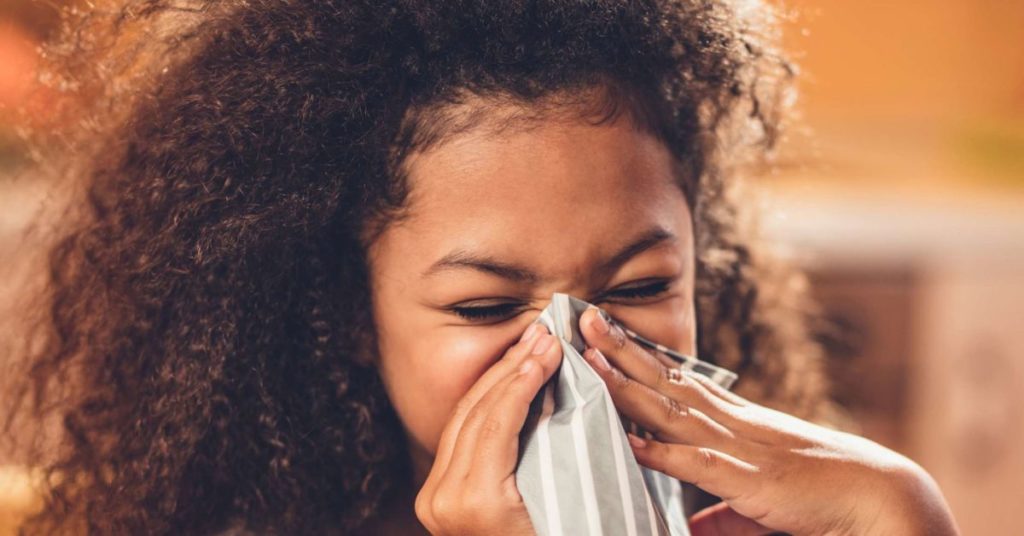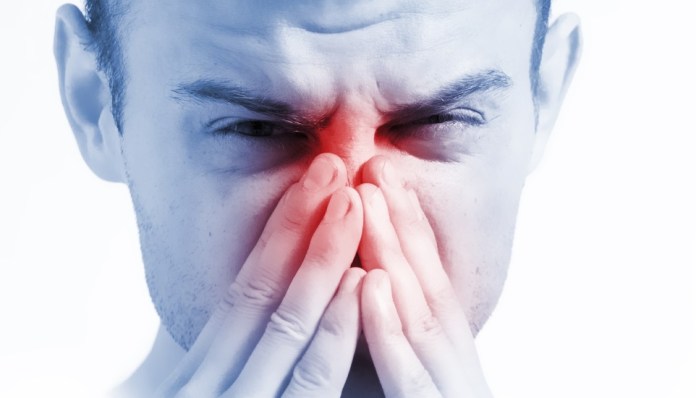ALLERGIC RHINITIS is a group of symptoms affecting the nose causing you to sneeze, have runny nose, BLOCKED NOSE, red eye, nose itching, throat itching, itchy eyes and watery eyes. When you have allergic rhinitis, it means your body is wrongly seeing harmless materials as harmful thereby responding to it in order to protect you. However, this protective mechanism by the body can be taken too far thereby harming the body itself. During this period, your body releases a chemical called HISTAMINE. It is this chemical that produce the symptoms listed above.

WHAT ARE THE TYPES ALLERGIC RHINITIS?
- Seasonal: If there is a particular time of the year that you sneeze, have blocked or runny nose with or without red eyes, you have seasonal allergic rhinitis. Symptoms of seasonal allergic rhinitis can occur in spring, summer and early fall/ rainy, dry or harmattan season. They are usually caused by allergic sensitivity to airborne mold spores or to pollens from grass, trees and weeds.
- Perennial: People with perennial allergic rhinitis experience symptoms year-round. It is generally caused by dust mites, pet hair or dander, cockroaches or mold. Underlying or hidden food allergies rarely cause perennial nasal symptoms.
WHAT ARE THE THINGS THAT CAN WORSEN ALLERGIC RHINITIS IN YOU?
There are some external factors which can worsen allergic rhinitis in you. This include:
- air pollution
- smoke
- perfumes
- hairspray
- wind
- cold temperature
- chemicals e.t.c.
HOW WILL YOUR DOCTOR TREAT YOU?
Choice of treatment depends on the discretion of your Physician. Your Physician will place you on any of the of the following drugs:
- Antihistamine, this can be given to you orally or by nasal spray. There are three generations of antihistamine. The first generation can make you feel drowsy while the second and third are less likely. Make sure you inform your doctor about the nature of your job when you have allergic rhinitis so that he will not place on the first generation that can make you feel drowsy at work.
- Steroid nasal spray, this helps to relieve sneezing, blocked nose and red eyes associated with allergic rhinitis.
- Leukotriene receptor antagonist, this is often used for seasonal allergic rhinitis
- Nasal decongestant, these are given to relief you of blocked nose. They are usually not used for more than three days.
HOW WILL YOU PREVENT ALLERGY?
- Always keep your mouth and nose covered to prevent exposure to dust.
- Don’t keep pet. Have your bath and change your clothes if you come in contact with one.
- Avoid exercising outdoor early in the morning.
- Avoid garden work(s).
- During allergic season, always keep your window and door shut.
- Frequently cleaning the house, including dusting and wet-mopping.
- Removing upholstered furniture and carpets.
- Exterminating cockroaches to eliminate exposure.
WHAT ARE THE OTHER CAUSES OF BLOCKED NOSE?
Common cold
Nasal polyp
Choana atresia
Foreign body in the nose, especially in children
Tumour etc.

Dr. Adeyemo Olusola is a medical graduate of Olabisi Onabanjo University, Ogun State, Nigeria along with certificate in advanced diploma in Principles of Nutrition, Management and Leadership, Dublin and Certificate in Global Health from London School of Hygiene and Tropical Medicine. In addition to his numerous certifications, he is a certified Telemedicine Physician from Harvard Medical School, USA. He is an avid reader of books from different oases of life, expert in data analysis. “So many a time, I have seen people die avoidable death because of lack of knowledge or information, falling victim of fate. There is then a necessity laid on us to help arm our society to the teeth, as a healthy society cannot be detached from an informed one. Hence, there is need for healthgist.net. We hope you will have a wonderful stay on our website.”

